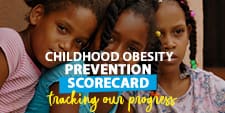
Dear Editor,
We, the members of Healthy Caribbean Youth, the youth arm of the Healthy Caribbean Coalition (HCC), from Antigua and Barbuda, are writing to call on the country to ensure that our children’s right to a safe and healthy school food environment is protected.
Far too many children in Antigua and Barbuda are suffering from poor nutrition which has a negative impact on their health. The 2018 Caribbean Island Urinary Iodine Survey assessed 200 children between the ages of 6-12 years in Antigua and Barbuda. More than a quarter of these children – 37.6 percent – were overweight.

An additional one in six of these children surveyed (16.2 percent) were living with obesity.
The food that our children are exposed to in places in which they live, learn and play, has a critical role in shaping food preferences for life and has a great impact on their physical and mental health.

Since our children spend a significant part of their day in school, the food offered and marketed in this space requires special attention. We are therefore calling for a national school nutrition policy that will provide guidance to schools to ensure that the foods available to our students are the best and healthiest options.

Currently, the National School Meals Programme in Antigua and Barbuda offers a lunchtime meal at no cost to thousands of students from 28 primary schools and three pre-schools. Concerns have however been expressed about the quality of meals offered by the programme, particularly the limited provision of vegetables and poor food presentation.
While other countries in the region like Barbados and Jamaica are well on their way to rolling out school nutrition policies, our country has no school nutrition policy in place. This means that:
● Our school administrators have no standardised and agreed-upon guidance to help them provide meals and snacks that are the best and healthiest choices for our students
● There are no national regulations or guidance about the marketing of unhealthy foods to our children in schools
● Our children in schools are at risk of being exposed to foods with excessive amounts of fats, sugars and salt which can hamper the development of healthy habits and ultimately contribute to the growing rates of childhood obesity and noncommunicable diseases (NCDs) affecting our country.
● Our children’s rights to a safe and healthy school environment are being jepoardised
We therefore call on our Ministers in charge of Health and Education to take the following steps to improve school food environments and address poor diet of school aged children:
1. Develop and implement a comprehensive school nutrition policy which protects children’s right to good health and wellbeing including respecting the right to nourishing food.
This policy should include banning the sale and marketing of ultra-processed foods and drinks in and around schools; ensuring availability of potable drinking water and developing sustainable partnerships with local farmers to improve accessibility to healthy, nutritious foods. The HCC recently released a resource that provides guidance on developing school policies that protect children from the harms of ultra-processed food.
2. Revise the School Meals Programme (while we await the national policy) with a focus on:
strengthening school food procurement programme to secure local whole foods for the school meals programme; strengthening human resource capacity by employing a permanent nutritionist/dietitian; and ensuring ongoing capacity building for the School Meals Programme staff to support provision of healthy meals; and meaningfully engaging children in decisions related to their nutrition by forming a student subcommittee to co-create school meal menus, provide program input and contribute to other health-
related issues. Parents should also be consulted through existing parent associations.
We hope that these efforts will be complimented by prioritizing a whole of school approach to physical activity; and securing tailored mental health services for the school community. It is time to invest in policies and strategies that promote health and prevent diseases, rather than just “reaction and treatment strategies”.
Shaping school environments to be spaces where children not only learn how to be healthy but actively practice healthy behaviours, is critical. We hope that our country’s children and their right to good nutrition and health will continue to be a top priority.
We stand ready to support and provide guidance on moves to protect our children’s health in schools. They deserve it!
Signed,
Healthy Caribbean Youth (Antigua and Barbuda)
Healthy Caribbean Youth (HCY) is the youth arm of the Healthy Caribbean Coalition. HCY is a regional group of young enterprising health advocates with various backgrounds who are
passionate about promoting good health and supportive environments for children, youth and the wider community.
The goal of HCY is to empower young Caribbean people as NCD prevention and control leaders, advocating for a healthier Caribbean.
Please contact [email protected] for any questions or comments
Advertise with the mоѕt vіѕіtеd nеwѕ ѕіtе іn Antigua!
We offer fully customizable and flexible digital marketing packages.
Contact us at [email protected]

















What U expect ?
Our youths are raised on KFC, Rice Pudding, Maw, Cow Foot Soup, Bread Butter Cheese-Chicken Sausage, Corn Beef, Nancy Glory, Chicken Fried Rice and a dash of Shawarma. And, we love alcohol.
The following need to take note:
Weston, Humpty Dumpty
Samantha, Ms Humpty Dumpty
Molwyn, Turtle mover
Robin, walking stick
Cutie, can’t run
Lionel and Melford- old aches and pain
Go check your nutrional requirements.
Totally agree. Nice that young people are stepping up to communicate this to the powers that be. Keep it up and surely the change will come soon. Looking forward to the future changes in policy…
Comments are closed.